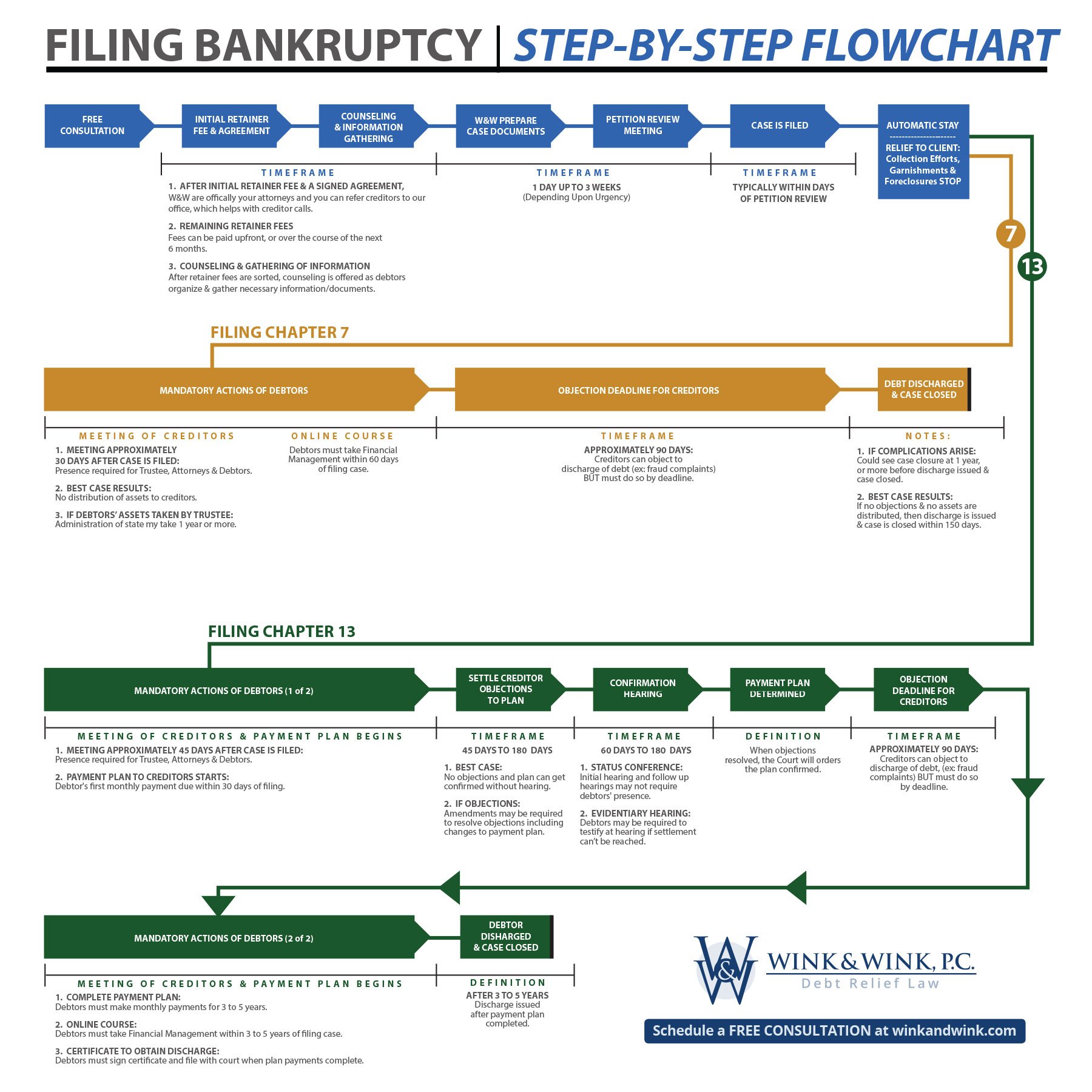Are you looking for effective steps to recover from bankruptcy and regain control of your financial future? Look no further! In this article, we’ll guide you through practical and actionable steps for recovering from bankruptcy effectively. Bankruptcy can be a challenging and overwhelming experience, but with the right approach, it can also serve as a turning point towards a brighter financial future. So, if you’re ready to take charge and bounce back stronger, let’s dive into the steps for recovering from bankruptcy effectively.
Steps for Recovering from Bankruptcy Effectively
Bankruptcy can be a challenging and stressful experience, but it’s important to remember that it’s not the end of your financial journey. With the right approach and mindset, you can recover from bankruptcy effectively and rebuild your financial health. In this article, we will explore the steps you can take to bounce back from bankruptcy and regain control over your financial future.
1. Understand the Causes of Bankruptcy
Before you can start the recovery process, it’s crucial to understand the factors that led to your bankruptcy. By identifying the root causes, you can make necessary changes to avoid repeating the same mistakes in the future. Some common causes of bankruptcy include:
- Excessive spending and poor budgeting
- Unemployment or loss of income
- Medical expenses
- Divorce or separation
- Unexpected financial emergencies
2. Create a Realistic Budget
One of the most important steps in recovering from bankruptcy is creating a realistic budget. A budget helps you track your income and expenses, prioritize your financial goals, and avoid overspending. Follow these steps to create an effective budget:
- Calculate your income: Determine your total monthly income from all sources.
- List your expenses: Make a comprehensive list of all your expenses, including fixed expenses (rent, utilities) and variable expenses (groceries, entertainment).
- Identify non-essential expenses: Review your list and identify any non-essential expenses that you can eliminate or reduce.
- Set financial goals: Prioritize your financial goals, such as building an emergency fund or paying off debts.
- Track your spending: Monitor your expenses regularly and adjust your budget as needed.
3. Rebuild Your Credit Score
Recovering from bankruptcy requires rebuilding your credit score. While it may take time, there are steps you can take to improve your creditworthiness:
- Check your credit report: Obtain a copy of your credit report from the major credit bureaus (Equifax, Experian, TransUnion) and review it for any errors or discrepancies.
- Pay bills on time: Consistently making on-time payments is crucial for rebuilding your credit. Set up automatic payments or reminders to ensure you don’t miss any payments.
- Start small with credit: Consider obtaining a secured credit card or a small personal loan to begin rebuilding your credit. Make sure to make timely payments and keep your credit utilization low.
- Keep credit utilization low: Aim to keep your credit utilization below 30% of your available credit limit. This demonstrates responsible credit management to lenders.
- Monitor your credit: Stay vigilant and regularly monitor your credit report to track your progress and identify any potential issues.
4. Build an Emergency Fund
Having an emergency fund is crucial for financial stability and can help prevent future financial crises. Start building an emergency fund by following these steps:
- Set a savings goal: Determine how much you want to save for emergencies, ideally at least three to six months’ worth of living expenses.
- Automate your savings: Set up automatic transfers from your paycheck to a separate savings account dedicated to emergency funds.
- Cut unnecessary expenses: Review your budget and identify areas where you can reduce spending to contribute more towards your emergency fund.
- Explore additional income sources: Consider taking on a side gig or freelancing to boost your income and expedite your emergency fund savings.
5. Seek Professional Guidance
Recovering from bankruptcy can be overwhelming, and seeking professional guidance can provide you with valuable insights and support. Consider the following options:
- Credit counseling: Consult a credit counseling agency to help you create a personalized plan to manage your debts and improve your financial situation.
- Financial advisor: Work with a financial advisor who specializes in helping individuals recover from bankruptcy. They can provide guidance on rebuilding credit, budgeting, and long-term financial planning.
- Bankruptcy attorney: If you haven’t already, consult with a bankruptcy attorney to ensure you understand your legal rights and obligations.
6. Learn from Past Mistakes
One of the most important steps in recovering from bankruptcy is learning from your past mistakes. Reflect on the decisions and behaviors that led to your financial difficulties and take proactive steps to avoid repeating them. Consider the following:
- Financial education: Invest in your financial education by attending workshops, reading books, or taking online courses.
- Develop healthy financial habits: Cultivate healthy financial habits such as saving regularly, sticking to a budget, and avoiding unnecessary debts.
- Build resilience: Embrace a mindset of resilience and determination. Remember that setbacks are a part of life, and with perseverance, you can overcome them.
7. Surround Yourself with Supportive Networks
Recovering from bankruptcy is not something you have to face alone. Surrounding yourself with supportive networks can provide encouragement, guidance, and accountability. Consider the following sources of support:
- Friends and family: Share your financial goals and challenges with supportive friends and family members who can provide emotional support and help you stay accountable.
- Support groups: Join local or online support groups specifically designed for individuals recovering from bankruptcy or financial difficulties.
- Community resources: Explore community resources such as financial literacy programs or workshops that can provide valuable support and education.
Recovering from bankruptcy is a journey that requires patience, determination, and a proactive approach. By understanding the causes of bankruptcy, creating a realistic budget, rebuilding your credit score, building an emergency fund, seeking professional guidance, learning from past mistakes, and surrounding yourself with supportive networks, you can effectively recover from bankruptcy and achieve long-term financial stability. Remember, it’s never too late to start rebuilding your financial health and securing a brighter future.
How Do We Recover After Bankruptcy?
Frequently Asked Questions
Frequently Asked Questions (FAQs)
1. What are the key steps for effectively recovering from bankruptcy?
By following these steps, you can effectively recover from bankruptcy:
- Evaluate your financial situation and create a realistic budget.
- Develop a debt repayment plan and prioritize your debts.
- Explore options for debt consolidation or negotiation with creditors.
- Consider credit counseling or financial education programs.
- Rebuild your credit by making timely payments and using secured credit.
- Monitor your credit report for errors and take steps to correct them.
- Focus on improving your financial habits and avoiding future debt.
- Seek professional advice and support if needed.
2. How can I evaluate my financial situation after bankruptcy?
To evaluate your financial situation after bankruptcy, you can:
- Assess your income, expenses, and assets.
- Track your spending and identify areas to cut back.
- Review your credit report and understand your current debts.
- Calculate your debt-to-income ratio to determine your ability to repay debts.
- Seek professional help from a financial advisor or credit counselor.
3. Can I negotiate with creditors to reduce my debt after bankruptcy?
Yes, it is possible to negotiate with creditors to reduce your debt after bankruptcy. You can:
- Reach out to your creditors and explain your financial situation.
- Propose a repayment plan or offer a lump-sum settlement.
- Seek help from a debt negotiation or settlement company.
- Get a written agreement from creditors before making any payments or settlements.
4. Should I consider debt consolidation to recover from bankruptcy?
Debt consolidation can be a helpful option for recovering from bankruptcy. It involves combining multiple debts into a single loan or payment, which can make it easier to manage your finances. However, it is important to carefully evaluate the terms and interest rates before opting for debt consolidation.
5. How can credit counseling help in the recovery process?
Credit counseling can be beneficial in the recovery process by providing guidance and support. A credit counselor can help you:
- Create a personalized budget and debt repayment plan.
- Learn about managing money and building positive financial habits.
- Understand your rights and responsibilities as a borrower.
- Negotiate with creditors on your behalf.
6. What steps can I take to rebuild my credit after bankruptcy?
To rebuild your credit after bankruptcy, you can:
- Obtain a secured credit card and make timely payments.
- Consider becoming an authorized user on someone else’s credit card.
- Make regular payments on any remaining debts.
- Avoid applying for too much new credit at once.
- Monitor your credit report and dispute any inaccuracies.
7. How long does bankruptcy stay on my credit report?
Bankruptcy typically stays on your credit report for seven to ten years, depending on the type of bankruptcy filed. During this time, it may negatively impact your credit score, making it important to take steps towards rebuilding your credit.
8. When should I consider seeking professional advice for bankruptcy recovery?
You should consider seeking professional advice for bankruptcy recovery if:
- You are overwhelmed with debt and unsure of how to proceed.
- You need assistance negotiating with creditors or creating a repayment plan.
- You have difficulty understanding your rights and responsibilities.
- You want guidance on rebuilding your credit and improving your financial situation.
Final Thoughts
Recovering from bankruptcy effectively requires taking a systematic approach. First, assess your financial situation and create a realistic budget. Cut unnecessary expenses and prioritize debt repayment. Second, establish an emergency fund to prevent future financial setbacks. Third, explore possible sources of income, such as a new job or side gig. Fourth, consider credit counseling or debt consolidation to manage your debts. Fifth, rebuild your credit history by obtaining a secured credit card or small loan. Lastly, practice patience and discipline as you work towards financial stability. By following these steps for recovering from bankruptcy effectively, you can regain control of your finances and achieve a brighter future.



